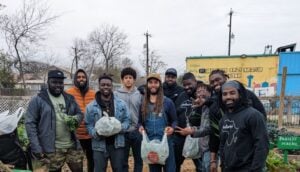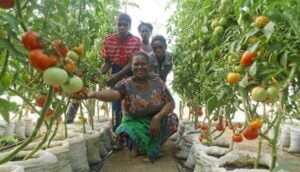Last week, our Rebuild Better Virtual Summit on Gender brought together experts and practitioners from across sectors and continents to ask what business can do to support women, particularly in view of the disastrous impacts of COVID-19 on gender equality and the empowerment of all women and girls.
Between 9-11 March, we explored three subject areas that are integral to this question.
- With UN Women, we asked “How can we unleash women’s enterprise?”. There are many opportunities for the private sector to step up, including in broadening access to finance, boosting confidence and skills, addressing barriers to financial inclusion, helping women access market opportunities and networks, taking time to understand the difficult tradeoffs that women are making in balancing their home and working lives, and developing new definitions of economic success that promote women’s wellbeing .
“It’s not pie – it doesn’t mean that if women get more opportunities, men get less – you just get a bigger universe of opportunities”
Arlene Isaacs-Lowe, Global Head of CSR, Moody’s Corporation and President, Moody’s Foundation
- With Care International UK, we asked “How can we tackle GBV in the workplace?” The cost of gender-based violence to the economy is staggering – UN Women have reported that GBV costs around $1.5 trillion dollars, which is approximately 2% of world GDP. Our discussions highlighted how the business sector can take action now, particularly in tackling GBV in the workplace and advocating for national ratification of the ILO’s Violence and Harassment Convention. In this, cross-sectoral partnerships are essential to build trust, make cultural shifts in companies and wider society, and to put management training, policies, and support in place for women workers.
“People think about this as the cost of doing something, but actually what is the cost of not doing anything?” Claudine McMahon, Global Head of Culture and Inclusion, Vodafone.
- Our final theme was “Empowering women in Agricultural Value Chains.” We examined how a range of cultural, legal and financial barriers to women’s empowerment can be overcome. Discussions highlighted the need for systemic shifts and the role of tech and digital tools, partnerships, data and monitoring, training, income diversification, and policy advocacy in bringing about change.
“It’s important to focus on systemic change at community and household level … providing support that changes systemically attitudes and behaviours towards women that really lead to gender equality.” David Schwebel, Community Advisor, Cargill
As well as live webinars, as part of the Gender Summit we curated a host of resources to support our community to take action on gender equality and the empowerment of women and girls.
A series of three concise Seminar Videos provide practical tips and advice on each of the three themes:
- What can companies do to help unleash the power of women’s enterprises? with Shiela Yabo, Business Strategist, Venture Builder, and Programme Manager for the Solution Space, an ecosystem for early-stage ventures at the Graduate School of Business, University of Cape Town.
- What can business do to help tackle Gender-based violence? with Dr Claudia Eger, Assistant Professor, Department of Management, Politics and Philosophy, Copenhagen Business School
- What can companies do to include and support women farmers? With Dr Esther Ngumbi, Assistant Professor, Entomology and African American Studies, at the University of Illinois
By purchasing a digital pass for the event, you can access recordings of all the webinars, plus fireside chats, insight summary reports and a curated library of Action Toolkits, Reports, podcasts and community articles by Business Fights Poverty and our community members.
If this is a topic that chimes with your own interests and work, we encourage you to join our LinkedIn discussion group, Business Fights Poverty Virtual Summits on Gender. Alongside the webinars we also hosted three live discussions on LinkedIn, sharing knowledge and advice amongst peers. In our feedback survey for the event, 83% of those who took part in these written discussions said that they’d formed a valuable connection.
We were also thrilled to release four new podcasts which all highlight the role of business in creating a world in which women can thrive.
- Elizabeth Vazquez, CEO and Co-Founder WEConnect International, shares her mission to increase the inclusion of women-owned enterprises in large business supply chains, and why this one simple step can make a significant impact. You can also read more about WEConnect’s work on Supporting Women-owned Businesses in the Time of COVID-19 .
- Blerta Cela, Deputy Regional Director, UN Women, explains that “COVID-19 is predicted to push 47 million more women and children into poverty” and explains how the Women’s Empowerment Principles (WEPs) are a powerful tool for businesses to help tackle the problem.
- Andrew Dunnett, Group Director of SDGs and Sustainable Business at Vodafone and Director of theVodafone Foundation, provides insights into how to scale impact for lasting good, and on the work Vodafone is doing to tackle domestic violence.
- Catalina Garcia , Global Director of Corporate Affairs, AB InBev, discusses partnering, scale, stakeholder insight, measurement and campaigns, as well as on the impacts of COVID on women, and on her experience as a female leader and as a mother of boys.
Articles published over the last three weeks have profiled many inspirational examples of action from across our community, particularly around gender equality. Here are some of my personal highlights:
- Embroidered with empowerment, from mother to mother shares the experience of Laura Rana, Founder of Khushi Kantha (‘Happy Blanket), who launched a social enterprise operating between the UK and Bangladesh during the pandemic, focused on women’s economic empowerment. It shows the power of taking action, as well as some of the challenges that Laura has encountered along the way.
- In The Fourth Industrial Revolution Needs Equality Tech, Nikita Shrubsole, Digital Policy and Advocacy Officer and Nora Lindström, Senior Lead for Digital Programming and Influencing, Plan International, explain why equality must be designed into the technology of the future, to tackle structural inequality and harmful norms and stereotypes.
- A new dawn for women smallholders in India provides insights from Harmanpreet Singh, Lead – Smallholder Farming for India, Bangladesh & Sri Lanka, on how Better Life Farming is having a positive impact on women farmers in India, where unequal agrarian systems limit their access to resources and land ownership.
- In A fair trade: putting farmers first in the fight for climate justice, David Taylor, Policy Manager for the Fairtrade Foundation looks at the urgent steps that are needed to build the resilience of farmers and workers who are vulnerable to the impacts of climate change. As he notes, “As we look to post-COVID recovery, we must commit to build back fairer, with a new approach to supply chains that is better able to face future emergencies and one that protects both people and the environment – for all our sakes.”
Finally, this week we released an Insights Report, The National Business Compact on Coronavirus
– A Year On: A New Blueprint for Rapid Collaboration? When the WHO declared the COVID-19 pandemic this time last year, businesses in Kenya came together to provide urgent action to support vulnerable communities and bolster the government response. The report identifies ten key elements that were key to NBCC’s effective response, at a time of great uncertainty. It also provides insights on the way organisations could work together to tackle future crises and challenges.










